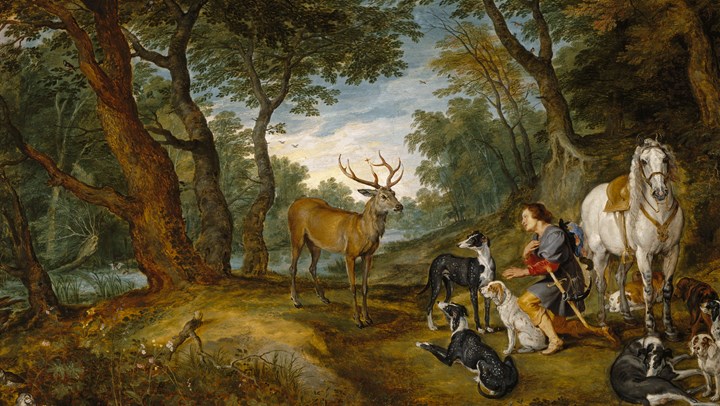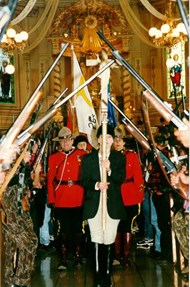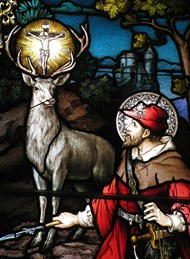
by James A. Swan, Ph.D. - Thursday, November 21, 2019

Did you know the only major religion in the world that doesn’t support hunting or eating meat is the ancient Indian religion known as Jainism? Not only do all other major religions support ethical hunting, but most religions and cultures conduct special ceremonies to guide, support and protect hunters. Many are based on ancient mythologies. For example, in the Yoruba religion of West Africa, the Orisha, or guardian spirits of the hunt, are: Ogun, who presides over fire, metal smithing, hunting and war; and Oshosi, who presides over archery. In Scandinavia, hunters recognize Alderman as their guardian spirit; Norwegians recognize Ullr as the god of hunting and archery; and Finns pray to the forest spirit, Tapio, before a hunt. The Celtic hunter’s deity is Cernunnos. The Greek mythological hunters’ gods are Artemis and Acteon. The Hindu hunter's god is Bhadra. In Buddhism, there are many different sects. While some do not like hunting, the people of Mongolia and Kazakhstan are hunters, and the Dalai Lama eats meat. But what about in the rest of the world?
In the United States where Christianity prevails, St. Patrick's Day and St. Valentine's Day have become commercial affairs with little meaning beyond green beer, greeting cards and flowers. A few churches in the Midwest and Rockies hold a "Hunter's Service" on the eve of hunting season, but in general the ethics and spirituality of modern hunting are left up to individuals. Perhaps that could change if you consider St. Hubert.
Each fall in Europe and in parts of Canada, special ceremonies and festivities are held to honor St. Hubert, the patron saint of hunting, woodsmen and metallurgy. The epicenter of his veneration is the town of St. Hubert in Belgium, near the Ardennes forest, which spans into Luxembourg, Germany and France. Annual festivities on and around Nov. 3—St. Hubert's birthday—draw crowds of 10,000 or more. Elsewhere in Europe, schools are closed on St. Hubert’s Day and churches conduct the Mass of Saint Hubert, where hunters, their dogs and falcons are brought into churches and cathedrals for blessings.
Who was the Christian Saint St. Hubert?
The eldest son of Bertrans, Duke of Aquitaine, Hubert was born in 638 A.D.—1,378 years ago. A prince in the House of Aquitaine in France, he enjoyed the life of nobility, but he especially loved hunting. After his wife died giving birth to their son, he retreated from the court and withdrew to the forest. As the legend goes, on one Good Friday when he should have been in church, Hubert galloped off on his horse to go stag hunting. His hounds cornered a large stag and as he approached it, he saw a vision of a glowing crucifix hovering over the stag's head between its antlers. A voice said, "Hubert, unless thou turnest to the Lord, and leadest a holy life, thou shalt quickly go to hell."
Hubert immediately dismounted, prostrated himself and begged forgiveness. "Lord, what wouldst Thou have me do?" he asked. The voice instructed him to seek guidance from Lambert, bishop of Maastrichcht. After seeking out the bishop, Hubert entered the Abbey of Staveleot, studied under Lambert and became a priest. He donated his possessions to charity and turned over the care of his young son to his brother.
Lambert advised Hubert to make a pilgrimage to Rome in 705 AD. During Hubert's absence, Lambert was murdered and the Pope selected Hubert to succeed him as bishop. Later Hubert built St. Peter's Cathedral in Liege, Belgium, on the spot where Lambert died, and was named patron of the city.
Hubert applied his passion for hunting to his faith, establishing Christianity in large sections of the Ardennes Forest. He preached to numerous hunters and is said to have hunted and kept dogs throughout his life. Hubert is also said to have been blessed with miraculous powers to heal rabies, aided by a special white and gold silk scarf that he said was given to him by the Blessed Virgin Mary. He also had a golden key—known as St. Hubert's key—which was reputed to be a healing amulet.
Hubert died on May 30, 727 A.D. and was widely venerated in the Middle Ages. In 1744, he was canonized and named the patron saint of hunting and hunters. His body rests in the Andain monastery, now known as St. Hubert's Abbey, in the Ardennes forest in Saint Hubert, Belgium, near where Hubert saw the stag and his vision of the cross.
Why am I telling you this? Because November is the month of St. Hubert’s Birthday, or the feast day of St Hubert, so it’s fitting to call attention to the patron saint of hunting and the various events that occur on or around Nov. 3. In France, Luxembourg, Germany and Belgium, thousands of people attend masses and celebrations in his honor. Special blessings are said for the health, safety and success of hunters and their animals, such as blessings to protect hunting dogs from rabies and other diseases. Religious music (Grande Mess de Saint Hubert) is performed by parforce hunting horns.
To many European hunters, making the pilgrimage to St. Hubert, Belgium, on Saint Hubert's Day is like visiting Jerusalem at Easter. For a U.S. hunter, one of the few things comparable is visiting Aldo Leopold’s “shack” on the banks of the Wisconsin River in Baraboo, Wisc., where he penned "A Sand County Almanac."
St. Hubert's Day in the United States?
While some celebrate St. Hubert in North America, honoring St. Hubert's Day across the continent would go far in helping the general public to learn more about hunting, accept man's role in the natural world and recognize hunting's value to wildlife conservation. In Kentucky there is a blessing of hunting hounds on the first Saturday of November. In early September in Cap St. Ignace, Quebec, (an area known for its snow goose migrations) the Mass of St. Hubert is said in the local church. Hunters file in dressed in their hunting clothes and bring their firearms and hunting dogs to be blessed. Then a procession of game wardens and clergy members enters and exits the church under an archway of guns held aloft by hunters wearing camouflage and hunter orange. Afterward the entire community shares nature's bounty at a wild game dinner. Such pageantry solidifies the ethics, spirituality and community acceptance of hunting.
Happy (belated) St. Hubert's Day!
Editor's Notes:E-mail your comments/questions about this site to:
[email protected]
